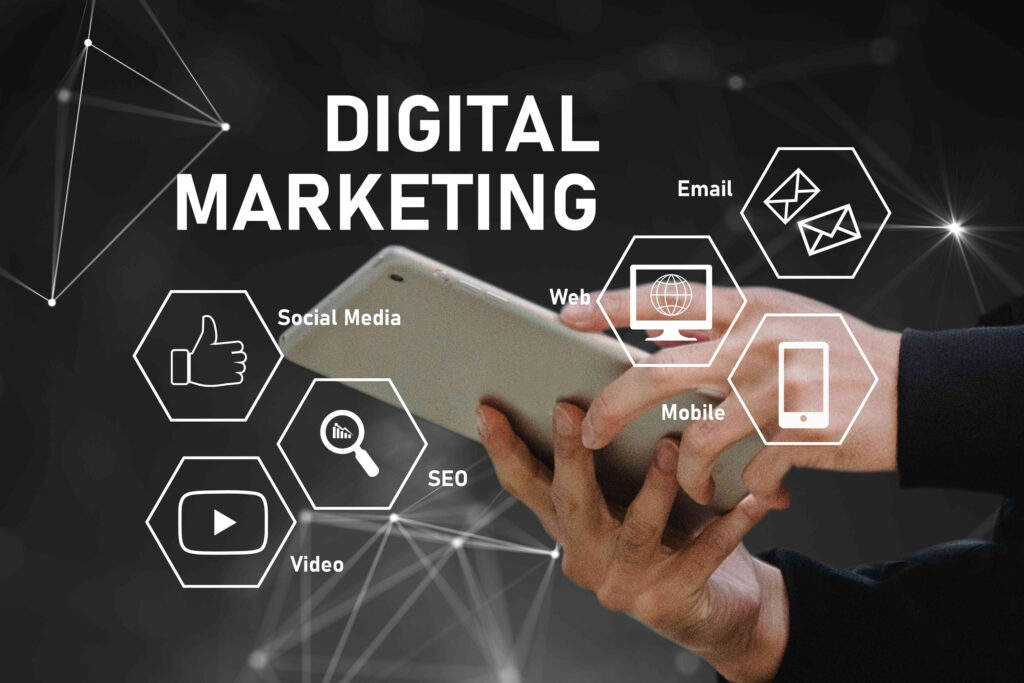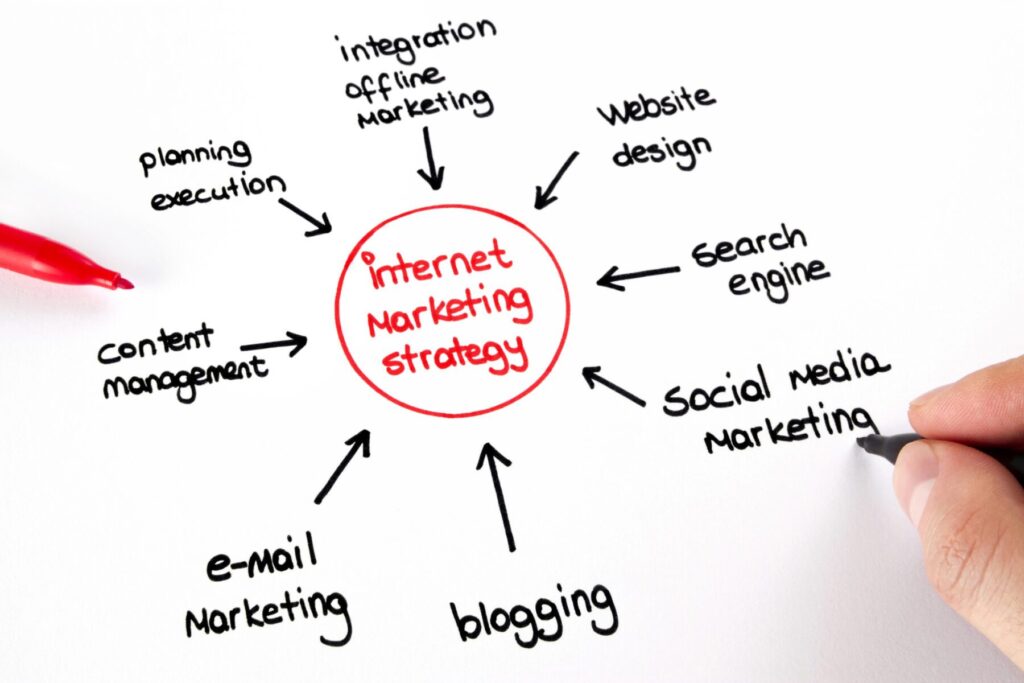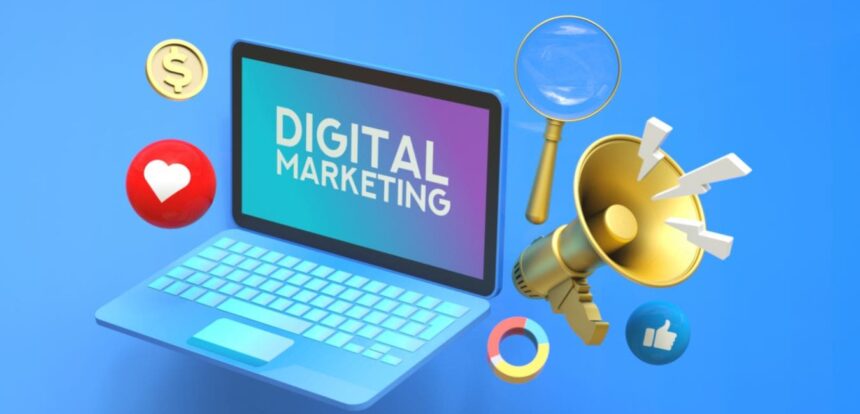In today’s world, businesses are no longer solely reliant on traditional marketing strategies. With the rise of the internet, digital marketing has emerged as an essential tool for businesses to stay relevant, competitive, and engaged with their target audience.
Whether you’re a small startup or a large corporation, understanding the value and potential of digital marketing is crucial. This article will explore what digital marketing is, why it’s important for businesses, and how it can be leveraged to achieve long-term growth.
What Is Digital Marketing?
Digital marketing refers to the use of digital channels, platforms, and technologies to promote or advertise products and services. It encompasses a wide range of activities, all aimed at reaching potential customers where they spend most of their time – online.
Unlike traditional marketing methods, digital marketing is highly targeted, measurable, and allows businesses to interact with their audience in real-time.
Key components of digital marketing include:
Search Engine Optimization (SEO): The practice of optimizing a website or content to rank higher on search engines like Google. SEO aims to drive organic traffic to a website by improving its visibility in search engine results pages (SERPs).
Content Marketing: Content marketing involves creating and sharing valuable content with the goal of attracting and engaging a target audience. This content can come in many forms, such as blog posts, videos, infographics, and social media updates.
Social Media Marketing: The use of social media platforms (Facebook, Instagram, Twitter, LinkedIn, etc.) to promote products, engage with customers, and build brand awareness.
Email Marketing: Sending targeted emails to a list of subscribers to promote products, services, or brand messaging. This method is particularly effective for customer retention and nurturing leads.
Pay-Per-Click (PPC) Advertising: A form of online advertising where businesses pay a fee each time their ad is clicked. Google Ads and Facebook Ads are popular platforms for PPC campaigns.
Affiliate Marketing: Partnering with other businesses or influencers to promote products and earn commissions based on sales or leads generated from their efforts.
Online Public Relations (PR): Managing a brand’s reputation and public image across digital platforms, including social media, blogs, and review sites.
Why Digital Marketing Is Crucial for Modern Businesses

The digital landscape has dramatically shifted the way businesses interact with customers. Consumers are now using the internet to research products, read reviews, and make purchasing decisions. Businesses that fail to adapt to this shift may find themselves falling behind their competitors. Here are several reasons why digital marketing is essential for businesses:
1. Global Reach
One of the biggest advantages of digital marketing is its ability to reach a global audience. While traditional marketing methods like print advertising and TV commercials may have limited reach based on geography, digital marketing can transcend borders. A well-executed digital campaign can attract customers from all over the world, significantly expanding a business’s potential customer base.
2. Cost-Effectiveness
Traditional marketing methods can be expensive, especially for small businesses. Billboards, TV commercials, and print ads require substantial budgets. In contrast, digital marketing is often more affordable and provides a higher return on investment (ROI). With digital marketing, businesses can choose from various affordable tools and strategies that allow them to tailor their approach according to their budget.
3. Targeted Marketing
Digital marketing enables businesses to target specific demographics, interests, behaviors, and locations. This is made possible through the use of tools like Google Analytics, Facebook Ads Manager, and customer segmentation techniques. By understanding the needs and behaviors of their audience, businesses can craft personalized messages that resonate with potential customers, leading to higher conversion rates.
4. Measurable Results
Unlike traditional marketing, where it’s often difficult to measure the effectiveness of a campaign, digital marketing offers real-time tracking and analytics. Tools like Google Analytics, social media insights, and email marketing platforms allow businesses to monitor campaign performance, track user interactions, and adjust strategies accordingly. This helps businesses make data-driven decisions to optimize their marketing efforts.
5. Improved Customer Engagement
Digital marketing allows businesses to engage directly with their customers through various online channels. Social media, email, and live chat give businesses the opportunity to interact with their audience, answer questions, and address concerns. This two-way communication helps build trust and loyalty, which is essential for retaining customers.
6. 24/7 Availability

Unlike traditional storefronts with limited hours, digital marketing ensures that your business is always accessible. Your website, social media profiles, and online ads can be viewed at any time, offering customers the convenience of interacting with your brand whenever they want. This is particularly important in today’s fast-paced, on-demand world.
7. Builds Brand Authority
Establishing a strong online presence through content marketing, SEO, and social media can help businesses position themselves as thought leaders in their industry. By providing valuable, informative content that addresses customers’ pain points, businesses can build trust and credibility. As a result, potential customers are more likely to choose a brand that they perceive as knowledgeable and reliable.
8. Increased Conversion Rates
With digital marketing, businesses can implement strategies to drive conversions – whether that’s completing a sale, signing up for a newsletter, or downloading an e-book. The use of retargeting ads, personalized offers, and clear calls to action can increase the likelihood of turning website visitors into paying customers.
9. Competitive Advantage
In a digital-first world, businesses that embrace digital marketing have a competitive edge. Digital marketing allows businesses to stay top of mind, build stronger relationships with customers, and keep up with industry trends. By staying ahead of the competition in the digital space, businesses can remain relevant and continuously grow.
How to Get Started with Digital Marketing
Getting started with digital marketing can be overwhelming, especially if you’re new to the field. However, with the right approach, it can become an invaluable asset for your business. Here’s a step-by-step guide to help you begin your digital marketing journey:
- Define Your Goals: Start by identifying what you want to achieve with digital marketing. Are you aiming to increase brand awareness, drive website traffic, or generate leads? Setting clear, measurable goals will guide your efforts.
- Identify Your Target Audience: Understanding your target audience is critical. Consider factors such as demographics, interests, location, and behaviors to create customer personas. This will help you tailor your marketing messages to resonate with your ideal customers.
- Choose Your Digital Marketing Channels: Based on your audience and goals, select the digital marketing channels that align with your strategy. If you’re targeting younger consumers, social media platforms like Instagram and TikTok may be ideal. For B2B businesses, LinkedIn might be more effective.
- Create a Content Strategy: Content is the backbone of digital marketing. Plan and create content that is informative, engaging, and aligned with your audience’s needs. Develop a content calendar and be consistent with your postings.
- Measure and Optimize: As you launch your digital marketing campaigns, track your performance using analytics tools. Continuously analyze your results and optimize your strategies to improve performance.
Conclusion
Digital marketing has become an indispensable tool for businesses in the modern world. From global reach and cost-effectiveness to the ability to engage directly with customers, digital marketing offers numerous benefits that traditional marketing methods simply cannot match. By embracing digital marketing strategies like SEO, content marketing, social media marketing, and email campaigns, businesses can establish a strong online presence, drive conversions, and remain competitive in a rapidly changing marketplace.
To succeed in digital marketing, businesses must stay informed about the latest trends, tools, and techniques. By continually adapting and optimizing your digital marketing efforts, you can ensure that your business remains at the forefront of your industry, building long-term growth and success.

